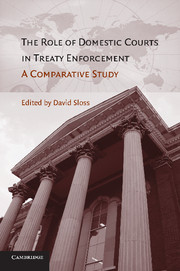Book contents
- Frontmatter
- Contents
- Contributors
- Preface
- Acknowledgments
- 1 Treaty Enforcement in Domestic Courts: A Comparative Analysis
- 2 Does International Law Obligate States to Open Their National Courts to Persons for the Invocation of Treaty Norms That Protect or Benefit Persons?
- 3 Australia
- 4 Canada
- 5 Germany
- 6 India
- 7 Israel
- 8 The Netherlands
- 9 Poland
- 10 Russian Federation
- 11 South Africa
- 12 United Kingdom
- 13 United States
- 14 The Role of Domestic Courts in Treaty Enforcement: Summary and Conclusions
- Index
- References
4 - Canada
Published online by Cambridge University Press: 06 January 2010
- Frontmatter
- Contents
- Contributors
- Preface
- Acknowledgments
- 1 Treaty Enforcement in Domestic Courts: A Comparative Analysis
- 2 Does International Law Obligate States to Open Their National Courts to Persons for the Invocation of Treaty Norms That Protect or Benefit Persons?
- 3 Australia
- 4 Canada
- 5 Germany
- 6 India
- 7 Israel
- 8 The Netherlands
- 9 Poland
- 10 Russian Federation
- 11 South Africa
- 12 United Kingdom
- 13 United States
- 14 The Role of Domestic Courts in Treaty Enforcement: Summary and Conclusions
- Index
- References
Summary
If asked whether Canadian courts enforce treaties binding on the state at international law, most Canadian judges and lawyers would say no. Some might hesitate a little or qualify their answers. Many would not. They would explain that treaties are not part of Canadian law unless given domestic effect by legislation, and even then a court interpreting or applying such legislation is not, in fact, enforcing the treaty but simply giving effect to domestic law. There is much truth in this depiction of the Canadian approach. But there is also some generalization, even some simplification. While the orthodox account of the place of treaties in Canadian law retains much of its force today, it was elaborated at a time when Canada's engagement with international law and international law's engagement with the domestic laws of Canada and other states were more narrowly circumscribed. An accurate account of treaty enforcement in Canadian courts today must pay due regard to received doctrines while also considering the contemporary practices of Canada's judicial, legislative, and executive branches of government. Seen in this light, Canadian courts play an increasingly important role in enforcing the state's treaty obligations, though largely through such indirect means as interpretive presumptions and implementing legislation.
THE STATUS OF TREATIES IN CANADIAN LAW
The status of international treaties in Canadian law is complicated by Canada's constitutional structure, which blends written constitutional provisions with unwritten doctrines and interpretive practices.
- Type
- Chapter
- Information
- The Role of Domestic Courts in Treaty EnforcementA Comparative Study, pp. 166 - 208Publisher: Cambridge University PressPrint publication year: 2009
References
- 2
- Cited by

